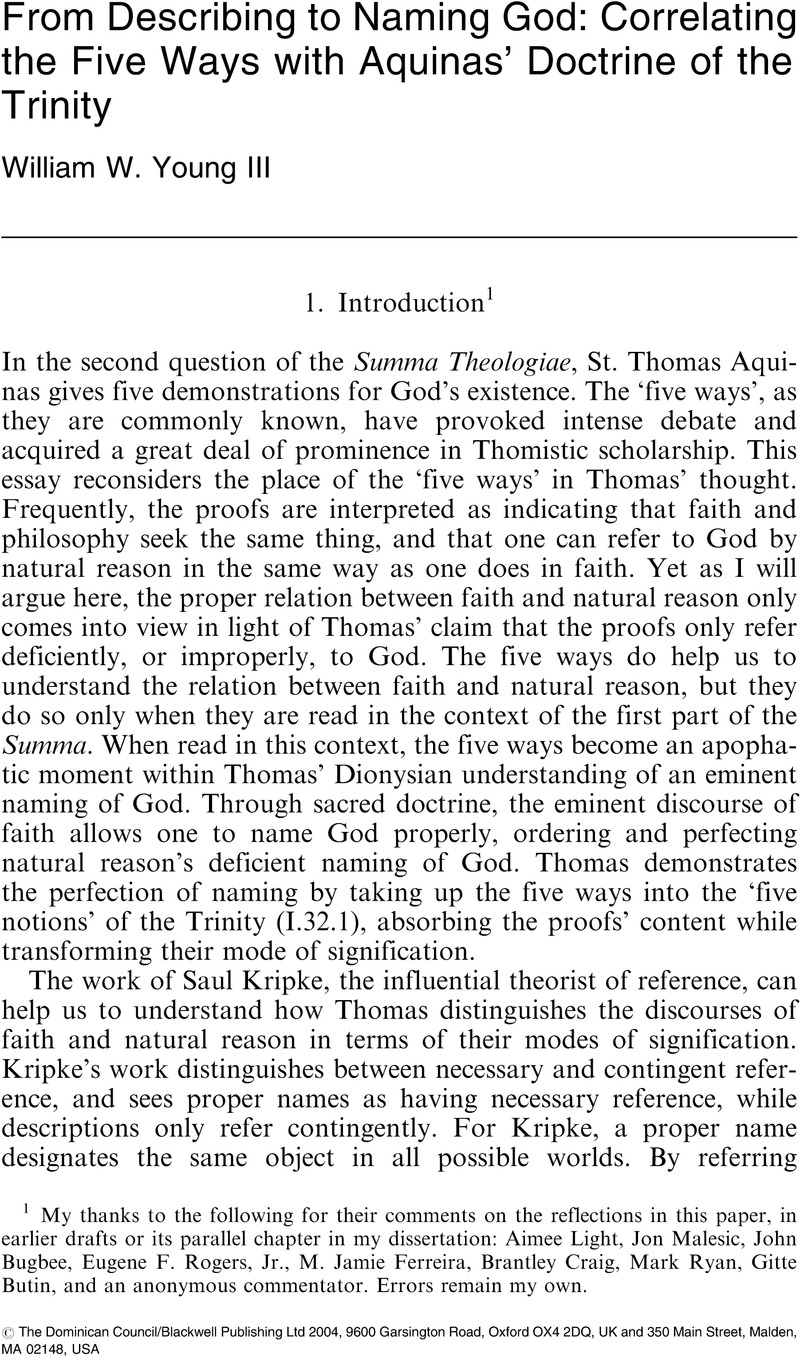Article contents
From Describing to Naming God: Correlating the Five Ways with Aquinas’ Doctrine of the Trinity
Published online by Cambridge University Press: 01 January 2024
Abstract

- Type
- Original Articles
- Information
- Copyright
- Copyright © The Dominican Council/Blackwell Publishing Ltd 2004
References
1 My thanks to the following for their comments on the reflections in this paper, in earlier drafts or its parallel chapter in my dissertation: Aimee Light, Jon Malesic, John Bugbee, Eugene F. Rogers, Jr., M. Jamie Ferreira, Brantley Craig, Mark Ryan, Gitte Butin, and an anonymous commentator. Errors remain my own.
2 In Kripkean terms, an a priori contingent description may help one to fix the reference, but it does not refer singularly.
3 Kripke, Saul A., Naming and Necessity(Cambridge: Harvard University Press, 1980)Google Scholar, passim.
4 Kripke, Naming and Necessity, p. 97.
5 St. Thomas Aquinas, Summa Theologiae, trans. Fathers of the English Dominican Province, 1947, part I, question 2, article 1. All future citations will be parenthetical (I.2.1).
6 Aquinas, Thomas St., Aristotle: On Interpretation (Peri Hermeneias), Commentary by St. Thomas and Cajetan, trans. Oesterle, (Milwaukee: Marquette University Press, 1962), p. 83Google Scholar.
7 Kenny, Anthony, The Five Ways: St. Thomas Aquinas’ Proofs of God's Existence(New York: Schocken Books, 1969), p. 35Google Scholar.
8 For more on quia demonstrations, see Jenkins, John, Knowledge and Faith in Thomas Aquinas(Cambridge: Cambridge University Press, 1997)Google Scholar, and Preller, Victor, Divine Science and the Science of God: A Reformulation of Thomas Aquinas(Princeton: Princeton University Press, 1967), pp. 88–90Google Scholar.
9 Louis Mackey argues that the five ways, properly considered, are a priori and ontological arguments. This is partly because, in my opinion, he misreads the relationship between quia and propter quid demonstrations, attributing a necessity to quia demonstrations that Thomas would not. However, I do agree with him that the five ways, as conditions for the possibility of the types of causality which we encounter in the world, could be read as a priori if not ontological arguments. The key is to distinguish epistemology and ontology, for which Kripke is quite helpful. See Mackey, Louis, ‘Entreatments of God: Reflections on Aquinas's Five Ways,’ in Peregrinations of the Word: Essays in Medieval Philosophy(Ann Arbor: University of Michigan Press, 1997), p. 118–9CrossRefGoogle Scholar. For a helpful discussion of the difference between propter quid and quia knowledge, see Jenkins, John, Knowledge and Faith in Thomas Aquinas(Oxford: Oxford University Press, 1997)Google Scholar.
10 Much of the following discussion is indebted to Victor Preller's reading of the five ways, and his location of various problems with the particular proofs. In some ways, the argument of this paper can be read as a response to a question that arises from his work: given the problems with the five ways as arguments, what function can they serve in Thomas’ theological enterprise, and how do they relate to what Preller calls the ‘material moves’ of faith? See Preller, Divine Science and the Science of God, esp. 108–135, and 266–71.
11 Preller, Divine Science and the Science of God, p. 131–35.
12 Anthony Kenny, The Five Ways, pp. 31–33.
13 In a recent essay, John R. Wilcox has argued that the five ways do all refer to the same God. As Wilcox argues, each of the five ways is a demonstration from causality, but also one that points to a ‘higher causality’(p. 267). In this higher causality, the five ways then all point to the same God. See John R. Wilcox, ‘The Five Ways and the Oneness of God,’The Thomist 62 (1998): 245–68. As Wilcox rightly notes, such divine unity and simplicity can only be found in faith. However, if this were the case, then I would argue that it is in Aquinas’ doctrine of the Trinity that he finds the ‘higher causality’ that unites the five ways. See below for further explication; my argument thus differs from Wilcox in that I do not think ST I. 11, on its own, can provide the requisite divine unity, even if it suggests that such unity is necessary.
14 Preller, Divine Science and the Science of God, p. 144.
15 Naming and Necessity, p. 44.
16 For a detailed discussion of suppositum and its place in Thomas’ work, especially with regard to the Christology, see Schoot, Henk, Christ the Name of God: Thomas Aquinas on Naming Christ(Leuven: Peeters, 1993)Google Scholar.
17 Pseudo-Dionysius, ‘The Divine Names,’ in Pseudo-Dionysius: The Complete Works, trans. Luibheid, (New York: Paulist Press, 1987)Google Scholar, and ‘The Mystical Theology,’ same volume.
18 While readings of Pseudo-Dionysius are numerous, I am using both Thomas’ own explication of Dionysius, and the analysis of Michel Corbin. See Corbin, Michel, ‘Négation et transcendance chez Denys,’Recherches des Sciences philosophiques et théologiques 69 (1985): p. 52Google Scholar.
19 Thus, the rationale for the five ways, while related to causality as Kenny describes it, is properly understood in relation to divine causality. The close parallels between the order of the notions and the proofs makes this a more tenable reading than that proposed by Lawrence Dewan, who reads the first four ways as related to the prima pars of the Summa, with the fifth way (governance of the world) constituting a starting point for the second and third parts of the Summa. See Dewan, Lawrence, ‘The Number and Order of St. Thomas's Five Ways,’The Downside Review 92 (1974): 1–18CrossRefGoogle Scholar.
20 I am grateful to John Bugbee for helping me to clarify this point.
21 Aquinas, Thomas St., Summa Contra Gentiles, Book 4, trans. O’Neil (Notre Dame: University of Notre Dame Press, 1975), p. 120Google Scholar.
22 I am grateful to an anonymous reader of an earlier draft for clarifying this problem and its possible resolution in terms of appropriation.
- 1
- Cited by




